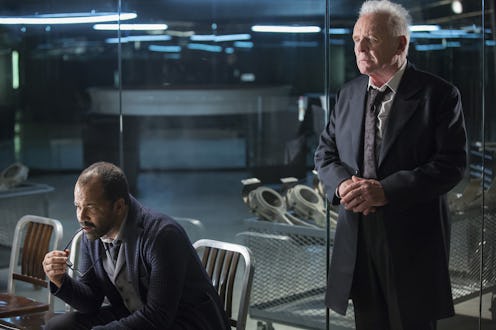
Although neither remakes nor sequels are a recent trend in Hollywood, there is a certain phenomenon that has become oddly more prevalent of late: the remake-that's-actually-a-sequel, or occasionally the sequel-that's-essentially-a-reboot. This phenomenon can be traced back to J.J. Abrams' 2009 reboot of Star Trek, and it also includes such recent hits as Mad Max: Fury Road, Jurassic World, Terminator: Genisys, and Star Wars: The Force Awakens. The trend has even extended to television, where FOX's The Exorcist makes reference to the events of the 1973 film rather than erasing them from existence. So is HBO's new sci-fi series a member of this strange hybrid club? Is the Westworld show actually a sequel to the movie?
The film, written and directed by Jurassic Park author Michael Crichton, told the story of a futuristic theme park called Delos where high-paying visitors could visit various "worlds" — West World, Medieval World, or Roman World — and interact with life-like androids. That story was seen primarily from the point-of-view of Peter, a first-time visitor, as he and his friend (a repeat Delos customer) arrived at the park just as the androids went buggy and started killing the human guests.
The show, on the other hand, tells the story of a futuristic theme park called Westworld run by the Delos Corporation where high-paying visitors can visit the town of Sweetwater and its surrounding environs and interact with life-like androids. This story, so far at least, is seen primarily from the point-of-view of the park's designers and its artificial attractions, who are starting to go buggy thanks to a recent update from enigmatic architect Dr. Ford.
There are just enough differences here for the show to feel like less of a faithful adaptation of its source material and more "inspired by" the film. The fact that HBO's Westworld isn't directly lifting the plot of Crichton's movie means that there's room for the events of the movie to have existed in the show's past. In fact, the pilot seems to imply this very point, when one of the park's programmers insists they haven't had a "critical failure" in 30 years.
Is that line a direct reference to the events of the 1973 film? Is the critical failure that took place in Westworld's past literally what happened in Westworld the movie? And if so, is Ed Harris' mysterious character — known only as the Man in Black, who says he's been coming to the park for 30 years — actually an older version of Peter, the sole survivor of the original film?
It's a neat theory, but one that sadly doesn't seem to be true. When asked whether the line about that long-ago "critical failure" was supposed to be a link to the movie, creator Jonathan Nolan told Entertainment Weekly that the reference was "playful but not meant to be literal."
We wanted to connect to the ideas in the original film, but also take a look at this place as a cultural institution that is not new – because these ideas aren't new. They stretch back to when Crichton was playing with them. We wanted to consider the park in that capacity, as a cultural institution in the manner of a Disney World. We feel like there's a long story here.
While it's certainly possible that Nolan is only telling half-truths in order to preserve an exciting plot twist, for now it seems that the reference to events several decades ago was merely used to illustrate how long the park has been running, and not to imply that the TV show is a literal follow-up to the film.
That's probably a smart move, since the original Westworld is not as widely known these days as the likes of Jurassic Park or The Road Warrior or A New Hope, so making the show a direct sequel might alienate some viewers who are unfamiliar with the film. And, based on the strength of the first episode, HBO's Westworld should do just fine standing on its own.
Images: John P. Johnson/HBO (2)